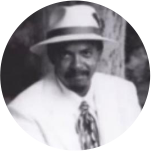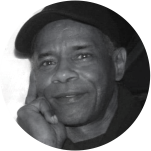Southern And Deep Soul From Louisiana

Label: Kent Catalog: – CDKEND 501 – Release Date: 28th May 2021 – Format: CD
South-West Louisiana is rightly famous for its homegrown music, Cajun, and its black Creole cousin, Zydeco. There is a romanticism to the area with its exotically named towns and a feeling that it has been cut off from the world. Yet, however much it may seem removed from America, it is still a part of it. Since the birth of the car, Route 90 and then the Interstate 10 have connected New Orleans, Louisiana and Houston, Texas, running straight through the region, opening it up to the world. The local industry that grew up to record the indigenous music was perfectly placed to document local versions of country, blues, funk, soul and pop, as musicians and live bands came through to play in the most important towns.

“You Gave Me Reason To Live” tells the story of locally recorded music that doesn’t fit into what was expected to be recorded in the area. Some of this music is often overlooked, and whilst in the last two decades the funk records of this part of the world have been taken to a wider audience, it seems that the deeper soul sounds are still largely unknown. Just like those funk tracks, these are recordings that reflect the fact that they were made by a Southern black population, whose heroes would have been the voices heard over the radio from Memphis, Nashville and, of course, New Orleans. Otis Redding is a key influence, as is Bobby Bland. This compilation gives us 22 examples of high-quality Southern soul on the labels – or subsidiaries – that made many of the finest Cajun recordings of the era. As Goldband’s Eddie Shuler said to John Broven, “Soul wasn’t huge in this part of the world but it was popular to the degree that you had to have it to get airtime. You have to be with whatever’s happening, that’s the way the American music culture works. It always has worked and always will work. You have to stay on top of the trends.”
Recorded between the early 60s and the first half of the following decade, the music here mirrors many of the changes in the wider Southern scene. Our earliest track is by Sticks Herman and shows a local version of the birth of soul, clearly developing on the back of doo wop. The former local blues star was experimenting with a new sound and ‘Lonely Feeling’ may not quite be soul yet, but is getting there. The later recordings by artists such as Moody Scott and Johnny Truitt show influences from the contemporary sounds of Memphis soul – Hi and Al Green were coming over the radio loud and clear.

The existence of these tracks is down to record men of the calibre of Eddie Shuler, Carol Rachou, J.D. Miller and others, who captured the local talent and touring musicians as they passed through their studios. They released timeless slices of pure emotion, just as they did with the other forms of music that crossed their paths. These records have an edge that suggests they were made outside of Southern soul’s major recording centres but are also instantly recognisable as soul music of the era. It is a pleasure to be able to unearth these sounds and present them to a new audience.
The history of the area can be traced back to the settlement of the Acadian French who – alongside the slaves who worked their land – were forced out of their home in Acadie (Nova Scotia) by the British in 1755. The remoteness of the land where they settled created a closed community, and their music has a direct link with the folk ballads that stretch back to their European past. The traditional music of the region has developed along two lines: the white Cajun music and the black Creole music that would mutate into Zydeco. In the years after the Second World War modern technology changed that, with TV and big-wattage radio stations – and now the internet – bringing the area into the American mainstream. Yet even today regional differences remain, and in the 60s and 70s they were pronounced, whether it was the continuing local dialect derived from French or the ability to have an independent music industry.

The recordings from Eddie Shuler’s group of labels, most notably ANLA, are the cornerstone of this release. None of the artists he worked with will be found in standard soul histories, and even in those written about the music of the region most don’t figure as anything more than a footnote. Based in Lake Charles, Shuler had been central to the re-establishment of a distinctively Cajun style of music when he recorded Iry LeJeune in the late 40s, and by the late 60s had spent 20 years as a small independent, documenting mainly distinctively regional music but also dabbling in blues, swamp pop, country, R&B and, in fact, anything to keep food on the table. His earliest track on this album is by Sticks Herman. Real name Herman Guidry, he had recorded for Goldband in the 1950s, making three high-quality R&B singles, of which ‘I’m Long Gone Baby’ and ‘The Natural Thing To Do’ were picked up nationally by the LA-based Hollywood label. Shuler was disappointed in Guidry and waited four years before recording him again. That single coupled the doo wop-sounding ‘Give Me Your Love’ with the plaintive early soul of ‘Lonely Feeling’ and came out on the Tic Toc label. Strangely, this Tic Toc single was released in the UK as one side of an obscure EP called ‘Rhythm And Blues’ on the tiny Range imprint.
In 1968 Shuler set up the ANLA label to release the contemporary soul artists that were popular at that time. Over the next four years he issued nearly 30 singles, none of which registered in any national charts. Reflecting the tastes of black audiences of the time – and probably also hedging their bets – many of the singles contained a funky uptempo side coupled with a deep southern ballad. It is likely that most of the acts were performers in local clubs, and their recordings wring out every ounce of emotion from the songs; it is this commitment that renders them so memorable. The artists signed to the label fall into two categories: those that Shuler signed himself and those brought to him by Port Arthur, Texas entrepreneur John White.

Of the former, Charles Greene features with his powerful voice on our opening track ‘Baby Oh Baby (How Far You Are From Me)’. There is some debate as to whether this is the same singer who appeared on ANLA as Big Daddy Green. If it isn’t, it’s a big coincidence to have two artists with such similar names signed to such a small label at almost exactly the same time, especially with no hint of any contradictory biographical information, but the spelling is different and the voice seems to be too. The artist who recorded as Big Daddy Green was born in Dayton, Texas as Louis Charles Green and spent most of his life in Lake Charles, where he was a singer with Cookie & the Cupcakes and for a time with Count Rockin’ Sidney’s groups. His ‘You Gave Me Reason To Live’ is an intense performance and provides us with the title of the compilation. It was the second of his two singles on the label and was coupled with the psychedelic funk of ‘Who Done It, Who Drained The Pool’. The real find is ‘On Bended Knees Begging’, which has remained unreleased until now and again shows a vocalist with plenty of ability to take on a showstopping ballad.
It’s likely that the guitar in ‘Who Done It’ was by Chester Randle, who made four singles for ANLA as Chester Randle’s Soul Senders and the Original Soul Senders. The personnel on those records were Chester, Bill Parker on drums and pianist Scotty Milford. Whilst mainly a funk outfit, the flip of their second single, ‘Take A Little Nip’, was the soul tour de force ‘Why Did I Let You Go’. Randle was a member of Parker’s band, who were a popular local act after scoring big with their late 50s Goldband single ‘Sweet Potato’. Parker’s real name was William Guidry, and he co-wrote the A-side of Terrie & Joy La Roy’s one single for ANLA, ‘Why I Shed So Many Tears’, a great slice of pop soul. A teen couple, Terrie & Joy’s flip side was possibly the finest record on the label (or at least my favourite), ‘Without Love What Would Life Be’. Neither Terrie nor Joy should have had the life experience to carry off this heartfelt message, but they do, ably backed by Parker’s Show Band.
Clifton White – who was described by Shuler as a “sit down artist”, meaning that he wouldn’t tour much – hailed from Beaumont, Texas and recorded three singles for ANLA in a funk soul mode, backed by his Royal Knights, including ‘If You Love Me’, which was the A-side of the last of his first run at the label. He and the group then made the super rare funk single ‘The Grade A’ for PMRC, before disbanding. With a new group in tow – the Texas Zydeco Boys – he returned to ANLA for one final single, ‘If I Thought You Needed Me’ b/w ‘Likker License’, which was also the label’s final release.
‘Sea Of Love’ by Phil Phillips was one of the biggest swamp pop hits – reaching #2 in the Hot 100 in 1959 – and is today a central component of popular culture used in films, TV and on adverts. It’s no surprise that it was reworked in a soul style, and Freddie Love’s version – produced by Shuler – is exceptional. Love released two singles for ANLA towards the end of the label’s run. Talking to John Broven, Shuler had vivid memories of Love: “He was out of Baton Rouge, he was blind, he came from that blind school over there in Baton Rouge. Some guy who was playing bass came over here and worked in the studio, then he wanted me to record this guy, Freddie Love. I listened to him and said, ‘Well, he’s got a good voice, we’ll give it a try.’ So they brought the musicians from over there, the music director from the school [Edwin Williams] who had the band business brought all the horns and all that stuff. And they brought 15 little gals from the same place, all them’s people in here playing and singing at the same time. Quite an array of people, OK. The music director was doing all the arranging and writing, so I left them alone.”
Along with his brother Elton, John White operated out of Port Arthur, a small city south of the I-10 from Beaumont. They looked after a number of acts, whom they brought to Eddie Shuler, and all of them made excellent records. Isaiah Porter performed as Ike Porter & the Fabulations, releasing two singles on ANLA and one on United Voice, which was presumably the Whites’ own label. That last single is an Impressions soundalike, whilst the two ANLA 45s included the far more southern-sounding ‘Love For Love’ and ‘If There’s A Will There’s A Way’. Dynamic Adam, whose real name was Adam Cormier, was clearly influenced by Otis Redding and Wilson Pickett and his singing on ‘She’s Gone’ and ‘Groove Maker’ is stunning, full of power but also aware of the importance of both phrasing and timing in getting his point across. The final White-produced artist is Soul Shouting Tommy, whose James Brown-styled A-side ‘I’m The Man’ is a great dancer, with its flip ‘To Be Loved By You’ showing another side to his talents.
Sidney Simien cut dozens of records in a variety of styles before he finally hit paydirt as the international face of Zydeco in the 1980s. Recording variously as Count Sidney, Count Rockin’ Sidney or Rockin’ Sidney, he will be remembered for his 1984 hit ‘My Toot Toot’. Born in 1938 in Lebeau, Louisiana, which was in the northern part of Cajun country, he got his break as a teen, playing guitar in his uncle Frank Simien’s group, which he soon took over. He recorded for a number of local labels before signing with Goldband in 1965, where he made a strong series of R&B and funk numbers, often released on the Bold imprint. ‘Trust’ came out as the flip of the single ‘Put It On’ in 1967 and is a fine example of Sidney’s soul vocal. Simien wrote the A-side for the first of Lee Bernard’s two Goldband singles, ‘Getting Out Of Town’. Nothing is known about Bernard except for his two excellent 45s, which coupled an uptempo side with something slower. Those two slower tracks, ‘Don’t Drive Me Deeper (Into The Ground)’ and ‘Our Love Will Always Be’, are included here.
Crowley-based Jay Miller was probably the best known of the South-West Louisiana producers, due to the hits he made for Excello, most notably those of Slim Harpo. His studio set-up was excellent and when he fell out with the Nashville-based label he started his own, of which Soul Unlimited – looked after by his son Mark – is the one that interests us here. With a small but perfectly formed catalogue of ten singles, its recordings were uniformly excellent, touching on all aspects of contemporary black music from the years in which it operated, 1972 to 1976. Johnny Truitt’s take on Kris Kristofferson’s ‘For The Good Times’ is a fine example of how country songs can translate to the soul world. Truitt had originally recorded as Little John on Neal, before J.D. Miller signed him to Excello’s Abet subsidiary in 1966. After Miller stopped working with the label, Truitt had singles produced in Muscle Shoals by Jimmy Johnson and Aaron Varnell. His Soul Unlimited 45 was his final release.

Our other Soul Unlimited record is Moody Scott’s Hi-influenced ‘One Man’s Happiness’. Scott was born in Hammond, Louisiana in 1944 and as Moody & the Deltas recorded for Leiber & Stoller’s Red Bird label in 1964, releasing one 45 on their Daisy subsidiary, ‘Everybody Come Clap Your Hands’ b/w ‘Monkey Climb’. He next popped up on Kapp in 1969, before moving to Sound Stage 7 and its sister imprint Seventy Seven, where he cut the two funk tracks for which he is probably best remembered today, ‘(We Gotta) Bust Out Of The Ghetto’ and ‘I Don’t Dig No Phoney’. His next stop was in Crowley, where he recorded his one single for the Millers. His final two 45s were made for the Long Beach, California label Straight Ahead in 1983 and 1984.
Camille “Lil” Bob was also a Soul Unlimited artist for a while, recording his funk classic ‘Brother Brown’ for the label in 1972. By the time he made that record he was already a veteran of the local scene with over a decade and a half of experience, having made his debut behind Goldband artist Good Rocking Bob at the end of the 50s. Around the same time he formed his band the Lollipops, who became one of the most popular groups on the local fraternity circuit with a set which presented exciting takes on soul and R&B favourites. They were signed to Carol Rachou’s Lafayette-based La Louisianne Records, where those covers were mixed in with original material over a number of singles and a collectible album, before signing with Jin for another album in 1967. The following year Camille returned to La Louisianne to release a stunning cover of Howard Tate’s ‘Stop’ – its long-overlooked flip ‘Soul Woman’ is equally as good.
Also on La Louisianne was Bernard Jolivette, who performed under the name of King Carl. He had made his name as the writer of Rod Bernard’s massive swamp pop hit ‘This Should Go On Forever’, which had first appeared on Floyd Soileau’s Jin label before being picked up nationally by Chess’ Argo subsidiary. Jolivette had written the song for the group that he was in with Guitar Gable, the Musical Kings, but their producer Jay Miller turned down the song (somewhat ironically, Bernard’s version was recorded in Miller’s Master-Trak studio). The Musical Kings continued to be a popular live draw, but Carl – sometimes spelt with a C, and sometimes with a K – recorded rarely. He made two singles for Rachou’s label four years apart; the second was the plaintive ‘Blues For Men’ in 1967 and it was to be his final release, although he continued to perform until his death in 2005.
Our final artist is Robert Charles Guidry, who is a name that towers over Southern Louisiana music due to the prominence of his first record ‘Later Alligator’, released by Chess, who decided he should perform as Bobby Charles. The song was immediately covered by Bill Haley, who renamed it ‘See You Later Alligator’ and made it one of the biggest hits of 1956. Over the next few years, Charles wrote big hits for Fats Domino with ‘Walking To New Orleans’ and Clarence Frogman Henry with ‘(I Don’t Know Why) But I Do’, yet his own releases for Chess and Imperial failed to score. He moved on to Stan Lewis’ Shreveport-based Jewel-Paula set-up and then to La Louisianne-distributed Hub-City, where he cut this stunning version of Eddy Raven’s ‘Big Boys Cry’. His next recordings were in upstate New York for Dylan and the Band’s manager Albert Grossman’s Bearsville label, where he made the exceptional “Bobby Charles” album with various members of the Band which featured the classic ‘Small Town Talk’, written with that group’s Rick Danko.
Dean Rudland, April 2021 22

















